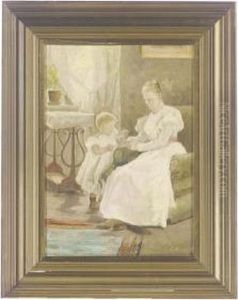Caroline Emilie Mundt Paintings
Caroline Emilie Mundt, better known under her pen name Louise Otto-Peters, was a German feminist and writer, considered a pioneer in the fight for women's rights in Germany. Born on March 26, 1808, in Meissen, Saxony, she grew up in an era marked by significant social change and political unrest that influenced her later activism and literary work.
From a young age, Otto-Peters showed a keen interest in literature and politics. Her early exposure to the works of the German romantics and the political upheavals of her time, including the Revolutions of 1848, shaped her intellectual development. She began her writing career as a journalist and author, initially publishing under the pseudonym Otto Stern. Her early works included poems, novels, and essays, which often highlighted the plight of women and the working class, advocating for social reform and gender equality.
Otto-Peters was deeply involved in the burgeoning women's movement in Germany. In 1865, she co-founded the Allgemeiner Deutscher Frauenverein (General German Women's Association), which was one of the first women's organizations in Germany, with Auguste Schmidt. As a leading figure in the German feminist movement, she fought for women's access to education and employment, as well as their right to participate in political life.
Throughout her career, Otto-Peters published numerous articles, essays, and books on women's rights, becoming an influential voice in the struggle for gender equality. Her literary works often featured strong female protagonists who defied societal norms, which served as a form of social commentary and an inspiration for women readers of her time.
Caroline Emilie Mundt, as Louise Otto-Peters, passed away on March 13, 1895, in Leipzig, Germany. Her legacy continues to be celebrated for her pioneering role in the German women's movement and her contributions to feminist literature.



